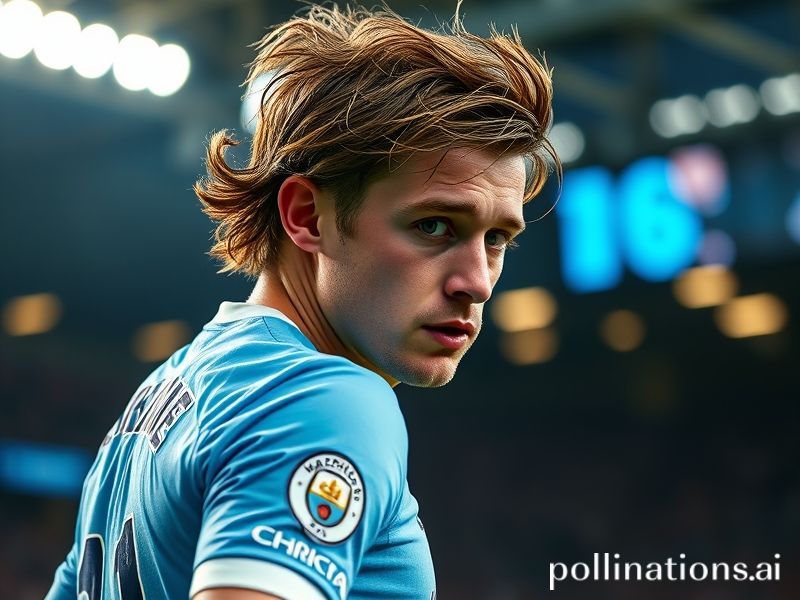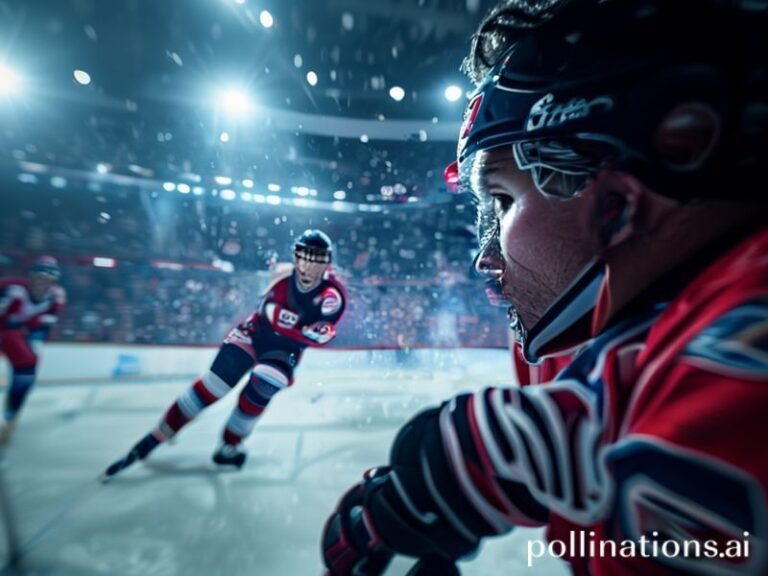Kevin De Bruyne: The Last Subversive Pass in Football’s Oligarch Circus
Kevin De Bruyne: The Last Gentleman in Football’s Age of Chaos
By our man in the cheap seats, watching empires burn in HD
Brussels to Baghdad, Lagos to Lima, the planet’s favorite circus—professional football—has rarely needed a quiet Belgian to remind it what competence looks like. Yet here he is, Kevin De Bruyne, a 32-year-old midfielder who passes the ball like a Swiss banker moves money: surgically, discreetly, and always with profit in mind. While the rest of us argue on Twitter about whether the world is ending by fire or flood, De Bruyne is threading through-balls so precise they could negotiate peace treaties. If that sounds hyperbolic, consider the alternative: the game is now owned by nation-states who treat human-rights records like optional accessories, broadcasters who’d televise a coup if it boosted ratings, and fans so tribal they’d happily radioactive-waste their own grandchildren if it helped the club “win the morning.” In that context, De Bruyne’s left foot functions as a tiny, stubborn act of sanity—an edible garnish on a plate of nuclear chicken.
Global implications? Start with the obvious: the English Premier League is the most-watched soap opera ever devised, beamed into 900 million homes whose occupants speak 0.7 languages of English on average. When De Bruyne slices open a low block, children in Jakarta learn geometry; loan sharks in Nairobi recalculate vig; arms dealers in Eastern Europe pause mid-text. For 90 minutes, the world’s most reliable constant is that a red-haired guy from Drongen will not misplace a 40-yard diagonal. Compare that to the International Monetary Fund, which has misplaced entire economies with far less grace.
The cynical read—this is Dave’s Locker, after all—is that De Bruyne’s brilliance merely lubricates a machine designed to hoover up working-class anger and convert it into content. Manchester City’s owner, His Excellency Sheikh Mansour, could lose De Bruyne in the sofa cushions of his private 747 and still bankroll three Champions Leagues. Kevin’s genius humanizes an outfit that is, on paper, a geopolitical marketing arm with a football subsidiary. Every outside-of-the-boot assist is another pixel in a soft-power screensaver, soothing Western regulators who’ve somehow convinced themselves that sportswashing is just hygiene with extra steps.
Still, watch him play and the sarcasm briefly evaporates. There is something indecently beautiful about a man who sees the vector you didn’t know existed, the nano-pocket of space between three converging bodies. In an era when world leaders can’t negotiate a Zoom call without muting themselves, De Bruyne negotiates chaos at 19 mph. If that talent were transferable, the UN would have airlifted him to Kyiv, offered him a five-year deal, and watched him slip diplomacy through a crowded box: cease-fire to the left wing, grain corridor to the right.
Instead, we get what we always get: a contract extension, a Nike commercial, and the slow-motion crucifixion of another knee ligament. Because the same global economy that exports his highlights also exports the calendar congestion that shreds his hamstrings. FIFA and UEFA have discovered you can monetize exhaustion; players are simply the hydrocarbons of the attention economy. De Bruyne’s recurring injuries are the planetary bill for 24-7 content—think of them as micro-climate disasters, only located in a single ankle.
Off the pitch, he speaks four languages and says nothing. This too is geopolitically efficient: silence travels tariff-free. When he does break it, the quotes scan like accidentally profound UN press releases. “I try to make the best decision.” Imagine that carved into the lobby of the Security Council, right above the veto buttons.
So what does Kevin De Bruyne ultimately signify? A fragile, almost laughable reminder that excellence without malice can still exist, even inside a structure engineered to monetize every heartbeat. He won’t save football from its oligarchs, and he certainly won’t save Earth from itself. But for the length of a highlights package, he allows us to pretend that precision still trumps propaganda, that grace can be non-transferable, non-fungible, non-tokenized. And in a world where everything—including your carbon footprint—has become an asset class, that may be the most subversive stat of all.







